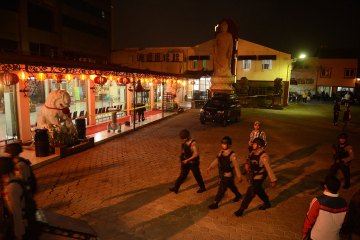
On Sunday evening a bomb blast rocked the Ekayana Buddhist Centre, a temple for Jarkarta’s Chinese Buddhists in the western area of Indonesia’s capital, leaving three members of the 300-person congregation with minor injuries. A second explosive device was found undetonated, smoldering in a bucket, with a note that read, “We respond to the screams of the Rohingya.”
Although loaded with “buckshot, batteries, and other materials,” the explosives were incapable of a major blast, a police spokesman told the Wall Street Journal, noting that the explosion failed to break the glass of a nearby door.
While Chinese-Indonesians have long been persecuted within Indonesia, and were disproportionately targeted and executed during the anti-communist genocide of 1965–66 (dramatized in the recent film The Act of Killing), Islamist bombings targeting Chinese-Indonesians as Buddhists are novel, and incredibly misguided considering their lack of ties to Burmese Buddhists.

The attack has raised worries of a more widespread global terrorist response to Burma’s sangha–led anti-Muslim pogrom, which, in addition to a strong grassroots base, enjoys support from the highest levels of government. The year 2012 saw a resurgence of anti-Muslim violence against the Rohingya of western Burma, a disenfranchised minority named one of the most persecuted in the world by the United Nations. General anti-Muslim hate quickly spread to the Buddhist-majority mainstream, prompting violence and demonstrations against Muslims in some of the country’s largest cities, including Mandalay, home to the Buddhist-extremist 969 Movement and its monk-leader, the “Buddhist Bin Laden” Wirathu.
The recent bombing, however, has as much to do with the interests of Indonesia’s Islamist groups as it does the Rohingya. The most populous Muslim nation in the world, Indonesia has a long history of jihadist and radical Islamist activites: Islamists commonly attack Christian churches and minority Muslims such as the Shi’ites and Ahmadis in the country, and Al Qaeda-linked extremists carried out numerous attacks there just over a decade ago. More recently, authorities disrupted a plot orchestrated by an Islamist terror network to attack Burma’s embassy in Jakarta using pipe bombs.
The plight of the Rohingya has been used as a rallying cry and a recruitment tool for Indonesia’s various Islamist groups. The “aggressive public response” has bolstered their popularity in the majority-Muslim country.
Part of this response has been to disseminate disinformation and misattributed photos regarding a nonexistent Rohingya militia, which was picked up by several unscrupulous reporters and bloggers, and cleared up by The Irrawaddy.
Unconfirmed reports of links between Islamic militants and the Rohingya have been used to “further fuel anti-Muslim sentiments” in Burma.
“This is an effort to provoke sectarian conflict,” said Indonesia’s Religious Affairs Minister Suryadharma Ali. “I ask Muslims and Buddhists not to fall for it.”
—Alex Caring-Lobel
Thank you for subscribing to Tricycle! As a nonprofit, we depend on readers like you to keep Buddhist teachings and practices widely available.